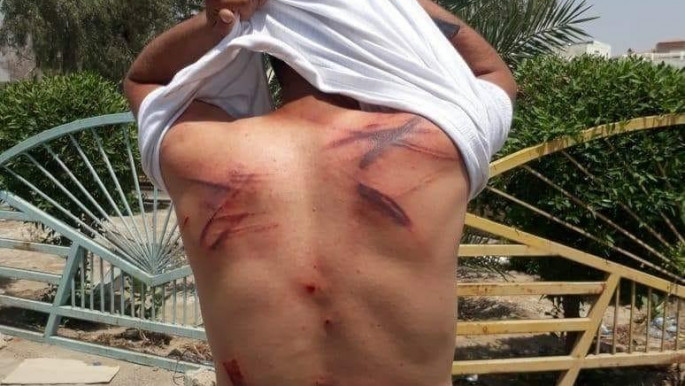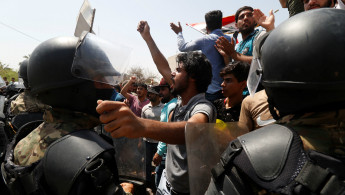Iraqi forces are using 'excessive lethal force' against peaceful protesters in Basra
Demonstrations erupted in oil-rich Basra on July 8 and have quickly spread across the country, as young Iraqis vent their anger over unemployment, high prices, power cuts and a lack of usable water.
Fresh protests hit southern Iraq over the weekend, with medical sources putting the number of demonstrators killed in the two weeks of unrest at 11.
Two protesters told Human Rights Watch that on July 8 at al-Qurna oil field, security forces killed at least one protester when they opened fire on the crowd, adding that the protest was peaceful until the killing, after which some people began throwing rocks at security forces.
"Iraqi authorities need to credibly and impartially investigate the apparent excessive use of lethal force in Basra, even where protests turned violent," said Sarah Leah Whitson, Middle East director at Human Rights Watch.
Human Rights Watch investigated eight protests, in six of which security forces allegedly fired live ammunition, wounding at least seven protesters.
 |
At least two officers hit my head, arm and back, before dragging me into their pickup truck... I got home and started throwing up blood |  |
They also threw rocks and beat at least 47 people, including 29 during or after arrest.
Witnesses said that in five protests, demonstrators threw rocks, gasoline bombs, and burning tires at the security forces.
 |
|
| The injured back of a man who attended the July 15 protest outside the Basra Governorate office. He said anti-riot police detained and repeatedly beat him with metal pipes and plastic cables [HRW] |
One protester said he saw a man hit by a Humvee armoured vehicle that was chasing him, while two men are still in comas from serious head injuries caused by the security forces.
Other witnesses have reported peaceful protesters being beaten with batons, cables and plastic hoses in attempts to disperse them.
Two protesters said that on the night of July 11 in Basra City, security forces beat at least 10 protesters with thick plastic pipes as they peacefully sat in a tent, then detained them, later releasing them from a checkpoint.
"Ten of us refused to go or take down the tent... then the forces started hitting all of us with thick plastic water pipes," a 23-year-old labourer who was part of the protest said.
"At least two officers hit my head, arm and back, before dragging me into their pickup truck along with another six guys from the tent. They blindfolded us, bound our hands and took us to a checkpoint of theirs about two kilometres away, before releasing us from there.
"I got home and started throwing up blood so went to the doctor the next day for an MRI. He said I was ok though I might have a concussion."
The internet was reportedly cut late on Thursday 12 July and signal remains weak across the country with several social media platforms still blocked.
Protesters have accused authorities of deliberately cutting internet access before security forces attack and open fire on them to prevent demonstrators sharing footage of abuses online.
"Blocking internet access to people in southern Iraq not only denies them their right to exchange information, but can put people in danger," Whitson said.
Human Rights Watch says that witnesses have identified and provided photos and videos of the Interior Ministry's anti-riot police, federal police, Special Weapons and Tactics (SWAT) forces, Strike Force Brigade (Liwa al-Quwa al-Thariba), and oil facilities police, all identifiable by their uniforms, policing the protests.
They said they observed these security forces beating numerous protesters with wooden, plastic, and metal sticks and pipes to disperse the crowds. In two incidents, they said, security forces beat protesters in custody and a journalist conducting an interview.
"So long as the government fails to address protester grievances, the danger of further bloody protests remains real."
The Iraqi government has not yet issued an official comment.





 Follow the Middle East's top stories in English at The New Arab on Google News
Follow the Middle East's top stories in English at The New Arab on Google News
![The UAE is widely suspected of arming the RSF militia [Getty]](/sites/default/files/styles/image_330x185/public/2024-11/GettyImages-472529908.jpg?h=69f2b9d0&itok=Yauw3YTG)
![Netanyahu furiously denounced the ICC [Getty]](/sites/default/files/styles/image_330x185/public/2024-11/GettyImages-2169352575.jpg?h=199d8c1f&itok=-vRiruf5)
![Both Hamas and the Palestinian Authority welcomed the ICC arrest warrants [Getty]](/sites/default/files/styles/image_330x185/public/2024-11/GettyImages-2178351173.jpg?h=199d8c1f&itok=TV858iVg)